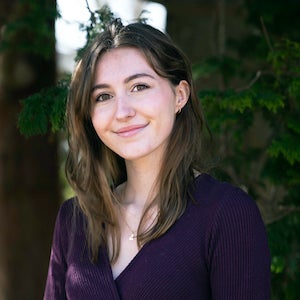Major: Physics
Hometown: Kingston, RI
Q. What makes the College of Arts and Sciences at URI unique?
A. The College of Arts and Sciences is unique in its ability to provide a diverse and fulfilling education. I was able to take classes that directly contributed to my education in physics like computer science, math, and chemistry, but also take classes like Spanish and music for my own growth and enjoyment. Through these classes I was also able to build friendships with students outside my major.
What accomplishments and/or activities at URI are you most proud of now?
I am very proud of my time as a teaching assistant where I’ve had the opportunity to help students learn physics. I began TAing my sophomore year and though it was intimidating at first, it’s one of my favorite things now. I love being a part of the learning process for students, especially when you can see a concept finally click.
I have also been a member of the URI Club Track and Field team since my freshman year and president for the past two years. Running as a part of a team is something I really enjoyed growing up and didn’t want to give up in college. I love that at practice I’m able to shut my brain off and just focus on running; it’s a great way to unwind after a long day of classes.
What research projects, internships, experiential learning, and/or study abroad programs did you participate in at URI?
I was very fortunate to have joined Dr. Michael Antosh’s research group in my sophomore year. In his lab we use nanotechnology to increase radiation sensitivity to cancer and study the biological effects of low dose radiation. Both Dr. Antosh and the graduate students in the lab have been amazing sources of knowledge and advice. They are never too busy to answer a question or demonstrate how to do something. Seeing how the ideas I learned in lectures could be used experimentally, especially their medical applications, furthered my passion for learning and research. My time in Dr. Antosh’s lab was a major factor in my decision to pursue a PhD.
Currently, I am working on a capstone research project under Dr. Antosh’s advisement. In this project I am investigating the gene expression of Nrf2 when exposed to low doses of radiation in an attempt to determine if there are significant changes in gene expression between samples that could signify a hormetic dose-response relationship.
What have been some highlights of your time in the Physics department?
All of my favorite moments in the Physics department have been in the physics library, a small room in the center of East Hall. I have grown so close to my peers because we spend all of our time there working on problems and sharing jokes. I specifically remember the week of Halloween my sophomore year, when someone left a bag of chocolates in the library to share. Amidst enjoying them, a peer mentioned that the speed of light can be measured by microwaving chocolate and measuring the distance between melted spots. Immediately everyone got up to conduct our little experiment and as we all stood around the microwave, Dr. Leonard Kahn walked in, smiled, and joined us. That was when I first really felt like I was a part of the department. A more recent time was this past week when, while catching up with a friend, Mr. Steve Pellegrino walked in to put away a chess set he had found. All of the students in the library immediately stopped what they were doing to look at the pieces and talk about their experience, or inexperience in my case, with chess. Everyone was quick to set up a game and show me how to play.
What’s next for you?
After graduating, I will be attending the University of Wisconsin-Madison to pursue a Ph.D. in medical physics. I will be working with Dr. Randall Kimple investigating molecular responses to radiation and therapeutic resistance to improve care of cancer patients. After receiving a doctorate degree, I hope to complete a medical physics residency and eventually become a clinical radiotherapy medical physicist.
Anything else you’d like to share?
I would like to thank all of the people in my life who have supported me on this journey; my family, my friends, my teachers, the people of Block Island, and of course the physics department here at URI.
The physics department is a small, tight-knit group, that encourages all of its members, despite age, gender, or position, to help one another learn and grow. I can confidently say that I wouldn’t have the same passion for knowledge that I have today without the sense of camaraderie that our department has. The department’s chairman, Dr. Leonard Kahn, is both a devoted educator and mentor whose commitment to building a community within the physics department is beyond exemplary. I can only hope to emulate this as I continue my education.

